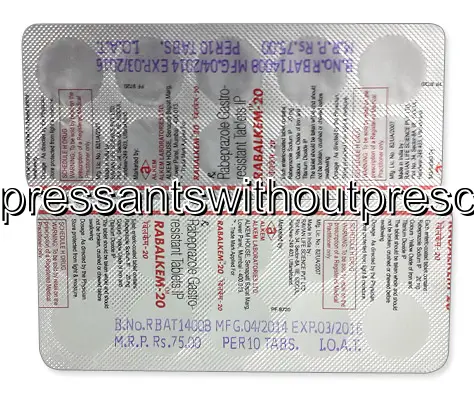| Package | Dosage | Price | Price per Dose | |
|---|---|---|---|---|
| Dosage: 10mg | ||||
| 360 pill | 10mg | £284.63 | £0.79 | |
| 180 pill | 10mg | £154.71 | £0.86 | |
| 120 pill | 10mg | £113.37 | £0.94 | |
| 90 pill | 10mg | £90.93 | £1.02 | |
| 60 pill | 10mg | £68.49 | £1.13 | |
| 30 pill | 10mg | £40.14 | £1.35 | |
| Dosage: 20mg | ||||
| 360 pill | 20mg | £569.27 | £1.58 | |
| 180 pill | 20mg | £305.89 | £1.70 | |
| 120 pill | 20mg | £224.39 | £1.87 | |
| 90 pill | 20mg | £178.33 | £1.98 | |
| 60 pill | 20mg | £124.00 | £2.07 | |
| 30 pill | 20mg | £66.13 | £2.21 | |
| 10 pill | 20mg | £24.79 | £2.47 | |

Rabeprazole Description
Overview of Rabeprazole
Rabeprazole is a medication primarily used to treat conditions caused by excess stomach acid. It belongs to a class of drugs known as proton pump inhibitors (PPIs). By reducing the amount of acid produced in the stomach, rabeprazole helps alleviate symptoms and promote healing of affected tissues. It is commonly prescribed for conditions such as gastroesophageal reflux disease (GERD), Zollinger-Ellison syndrome, and for preventing gastric ulcers caused by long-term use of certain medications. Many patients find rabeprazole effective in managing their symptoms with relatively few side effects, making it a popular choice in the treatment of acid-related disorders.
How It Works
Rabeprazole works by blocking the activity of the gastric proton pumps in the stomach lining. These proton pumps are responsible for secreting hydrochloric acid, which causes the acidity of gastric juices. By inhibiting these pumps, rabeprazole significantly decreases acid production. This reduction in acid not only relieves discomfort but also allows damaged tissues in the esophagus and stomach to heal. Because it acts directly on the proton pumps, rabeprazole is fast-acting and effective in providing symptomatic relief. Its mechanism of action makes it different from antacids, which neutralize existing stomach acid temporarily, offering a more sustained treatment approach.
Efficacy and Usage
Patients usually take rabeprazole once daily, often before breakfast. The duration of treatment depends on the condition being treated and the patient's response. Many users report noticeable relief from symptoms within a few days of initiation. For GERD or ulcers, treatment may last from a week to several months. It is essential to follow the prescribed dosage and not to adjust it without consulting a healthcare professional. In some cases, the physician may recommend a course of treatment combined with lifestyle modifications such as dietary changes, weight management, and avoiding triggers like spicy or fatty foods. Overall, rabeprazole has proven to be an effective medication for controlling acid production and promoting healing in affected tissues.
Possible Side Effects
Like all medications, rabeprazole can cause side effects, although they are generally mild and uncommon. The most frequently reported issues include headache, nausea, diarrhea, or constipation. Some users might experience abdominal pain or dizziness. In rare cases, prolonged use of rabeprazole has been associated with vitamin B12 deficiency, bone fractures, or infections such as Clostridium difficile in the colon. It is important for patients to inform their healthcare provider if they experience persistent or severe side effects. Regular monitoring may be recommended during long-term therapy to prevent potential complications.
Precautions and Interactions
Rabeprazole may not be suitable for everyone. Patients with liver disease or allergy to proton pump inhibitors should consult their doctor before starting treatment. Additionally, some medications may interact with rabeprazole, including certain antifungals, HIV medications, and blood thinners. These interactions can affect drug efficacy or increase the risk of adverse effects. To minimize risks, it is vital to disclose all current medications and medical conditions to the prescribing doctor. Pregnant or breastfeeding women should also seek medical advice before using rabeprazole. Proper consultation ensures safe and effective use of this medication.
Conclusion
Rabeprazole remains a reliable option for managing various acid-related gastrointestinal conditions. Its ability to rapidly and effectively suppress gastric acid makes it a popular choice for both patients and healthcare providers. When used appropriately and under medical supervision, rabeprazole can significantly improve quality of life by reducing discomfort and promoting tissue healing. As with any medication, understanding its uses, potential side effects, and interactions is essential for safe treatment. Many users find that, after a course of therapy, their symptoms diminish or disappear, allowing them to enjoy a more comfortable, symptom-free life.
